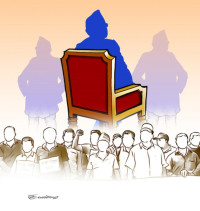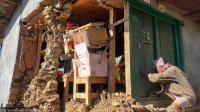Opinion
Red chameleons
Return of Ram Bahadur Thapa and his followers could signal the possibility of Prachanda turning slightly to the left
Deepak Thapa
Ram Bahadur Thapa must be feeling rather sheepish nowadays. At least that is how the supposed brains behind the ‘People’s War’ looked in photographs showing him sharing sweets with Prachanda, his old comrade-in-arms from Chitwan. He was celebrating his imminent return to a party he along with Mohan Baidya and a host of other prominent Maoists had reviled while walking out in 2012. And, what did they all have to show for all that grandstanding? Four years in the political wilderness, and, most importantly, a dilution of the agenda for which they had waged a decade-long war at the cost of thousands of lives.
1998 and 2012
The Maoist fracture has seemed eerily similar to what transpired in 1998. Then, the UML split into two, and immediately resorted to the expected name-calling. Neither could stand the sight of the other as the nation went into the 1999 election. Portraying itself as the more radical nationalist, CPN-ML’s raison d’être appeared to be the defeat of the CPN-UML, even if that meant handing victory to the Nepali Congress, which itself was desperate to regain its pre-eminent position, something it had ceded to the UML in 1994 following its own factionalism. The results made everyone happy: the Nepali Congress (NC) received a majority; the UML was no longer the largest party; and the ML got zilch. Three years later, everything was forgotten, the two UML factions united, and everyone got along well—except for one group that called itself the CPN-ML, lived a peripheral existence and seemingly became more conservative than the UML, until the PR system revived its fortunes and allowed its leader to become one of the deputy PMs.
Fast forward to 2012 and the Maoist split, preceded and followed by the name-calling while the 2013 election was boycotted by Vaidya and gang, to the extent that it was even reported that the boycotters went all out to support anyone who could beat the Prachanda Maoists. The result was as in 1999, the conservative forces (and this group now included the UML) took the lead and the semi-radical UCPN-Maoist was left playing second fiddle to the NC and the UML. Three years later, everything is being forgotten, the two parties are being united, and everyone is getting along well—except for the sore old Mohan Baidya, and the splinter group of Biplab Maoists who have been trying desperately to make their presence felt through random acts of anarchy.
Naya Shakti
What of the other splinter, the one that broke away from Prachanda more recently? We last heard from Baburam Bhattarai’s outfit on Nepali New Year’s Day with its appeal to all Nepalis to become one of the founding members of a party with the ‘historic responsibility’ to fill the need for a ‘left-democratic party’. Given that the left of Prachanda was fully occupied, it was a smart move on the part of Bhattarai to claim a space that had been the preserve of the UML for much of the post-1990 period, even as it crept towards the right.
To explain what his party stands for, Bhattarai (presuming it was he who wrote the document) resorted to an alliteration of five ‘s’s (in Nepali): i) samriddhi: prosperity, ii) samanupatik, samabeshi ra sahabhagitamulak loktantra: proportionate, inclusive and participatory democracy, iii) swadhinta ra pragatishil rastrabad: independence and progressive nationalism, iv) sushasan ra sadachar: good governance and righteous conduct, and v) samunnat samjabad: progressive socialism.
As someone who swore by Marx and his acolytes for most of his adult life, Bhattarai has steered rather conspicuously clear of any mention of a class struggle. Bhattarai disavows a lifetime of thinking in such words: The socialism of yesteryears that believed in centralised authoritarianism cannot be the guide to a future society; no one needs a socialism that distributes poverty, a socialism that distributes tyranny, a socialism that distributes centralism. Hence, the adoption of ‘progressive socialism’.
The appeal by Naya Shakti also analyses the current state of Nepali politics as being dominated by debates around issues that had animated politics in the earlier centuries, with the result that everyone had prejudiced views of each other and resorted to name-calling.
I would argue Bhattarai is wrong on all three counts. Starting from the last, name-calling is something one has to master over the years and no one does it better than the comrades. Among some of the more colourful ones I remember deployed here in Nepal are: ‘counterrevolutionary’, ‘revisionist’, ‘petit-bourgeois’, ‘lumpen-proletariat’, ‘dogmatist’, ‘splittist’, ‘deviationist’, ‘careerist’, and ‘adventurist’. The comrades have a veritable arsenal of such accusatory terms, a personal favourite being the declensions, ‘Trotskyite’, ‘Trotsky-fascist’ and ‘Trotsky-fascist hyena’ although none seems to be in vogue here. Bhattarai himself has proved quite adept at this game. To take but one example, he once accused his one-time mentor, Mohan Bikram Singh, of ‘dogmato-revisionism’ and ‘parliamentary cretinism’ in the short space of one article in answer to Singh’s calling the ‘People’s War’ a form of ‘ultra-left adventurism’. Enough to make one’s head spin, trying to wrap one’s brain around these forms of deep insult.
As for prejudice, just one look at the current government that has both the Maoists and the monarchists is enough to convince us otherwise. And it is hardly true that our political parties are animated by debates and discussions. A lot of that goes on in the far left, and one only has to look at the more than two dozen tomes produced by Mohan Bikram Singh, the father of all the Maoist parties in Nepal, and one gets a sense that not having the levers of power in one’s own hands and with all the time to do nothing but cogitate on the nature of life and the world of politics is certainly conducive to political debate. Contrast that with the UML and nothing much has actually happened there for more than 20 years; everyone is just too busy with politics and everything that comes with it. As for the NC, the last ideological debate happened a lifetime ago, and the RPP in its various avatars are nothing but opportunists, bereft of any recognisable ideology.
Whither Prachanda
Interviewed in 2006 by political commentator and leftist intellectual, Jhalak Subedi, not long after surfacing into open life after more than a quarter of a century, Prachanda explained what their approach to socio-political change has been: ‘We have, on one side, parties like the UML, who in its “progress” has gone for class co-existence. Whatever we are attempting in Nepal is both risky and challenging... In the course of revolution, if one goes Left, then they are Leftists. If they swerve to the Right, then they will be Rightists. We are walking on both our legs. Sometimes the left foot leads, sometimes the right foot is forward. It is only by walking on both our legs that we accomplished the ten years of struggle.’
Whatever the internal reasons may have been, it was Prachanda’s overt reliance on the right leg that gave cause for Ram Bahadur Thapa and the others to decide it was time to part ways. Not much changed in the interim but the return of Thapa and his followers could signal the possibility that Prachanda is getting ready to flex the left leg, especially since Bhattarai has slid into the space immediate to the right. Let’s see how far that analogy will take them, and the country.




 12.12°C Kathmandu
12.12°C Kathmandu










